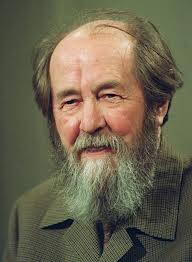Difference between revisions of "Alexandre Isayevich Solzhenitsyn"
Jump to navigation
Jump to search
m (add person template) |
(Added: employment, alma_mater, constitutes, birth_name, birth_place, citizenship, children.) |
||
| Line 8: | Line 8: | ||
|wikipedia=https://en.wikipedia.org/wiki/Aleksandr_Solzhenitsyn | |wikipedia=https://en.wikipedia.org/wiki/Aleksandr_Solzhenitsyn | ||
|website=http://www.solzhenitsyn.ru/ | |website=http://www.solzhenitsyn.ru/ | ||
| + | |alma_mater=Rostov State University | ||
| + | |constitutes=Novelist, Soldier, Teacher | ||
| + | |birth_name=Aleksandr Isayevich Solzhenitsyn | ||
| + | |birth_place=Kislovodsk, Russian SFSR | ||
| + | |citizenship=Soviet Union Stateless Soviet Union Russia | ||
| + | |children=Yermolai Solzhenitsyn, Ignat Solzhenitsyn, Stepan Solzhenitsyn | ||
| + | |employment= | ||
}} | }} | ||
'''Aleksandr Isayevich Solzhenitsyn''' (11 December 1918 – 3 August 2008) was an eminent Russian novelist, historian, and tireless critic of Soviet totalitarianism. He helped to raise global awareness of the gulag and the Soviet Union's forced labour camp system. While his writings were often suppressed, he wrote many books, most notably ''The Gulag Archipelago, One Day in the Life of Ivan Denisovich'' and ''[[Two Hundred Years Together]]''. Solzhenitsyn was awarded the Nobel Prize in Literature in 1970, ''"for the ethical force with which he has pursued the indispensable traditions of Russian literature"''. He was expelled from the Soviet Union in 1974 but returned to Russia in 1994 after the dissolution of the Soviet Union. | '''Aleksandr Isayevich Solzhenitsyn''' (11 December 1918 – 3 August 2008) was an eminent Russian novelist, historian, and tireless critic of Soviet totalitarianism. He helped to raise global awareness of the gulag and the Soviet Union's forced labour camp system. While his writings were often suppressed, he wrote many books, most notably ''The Gulag Archipelago, One Day in the Life of Ivan Denisovich'' and ''[[Two Hundred Years Together]]''. Solzhenitsyn was awarded the Nobel Prize in Literature in 1970, ''"for the ethical force with which he has pursued the indispensable traditions of Russian literature"''. He was expelled from the Soviet Union in 1974 but returned to Russia in 1994 after the dissolution of the Soviet Union. | ||
{{SMWDocs}} | {{SMWDocs}} | ||
{{Stub}} | {{Stub}} | ||
Revision as of 11:18, 20 September 2015
(Novelist, Soldier, Teacher) | |
|---|---|
 | |
| Born | Aleksandr Isayevich Solzhenitsyn 11 December 1918 Kislovodsk, Russian SFSR |
| Died | 3 August 2008 (Age 89) Moscow, Russia |
| Citizenship | Soviet Union Stateless Soviet Union Russia |
| Alma mater | Rostov State University |
| Children | • Yermolai Solzhenitsyn • Ignat Solzhenitsyn • Stepan Solzhenitsyn |
Aleksandr Isayevich Solzhenitsyn (11 December 1918 – 3 August 2008) was an eminent Russian novelist, historian, and tireless critic of Soviet totalitarianism. He helped to raise global awareness of the gulag and the Soviet Union's forced labour camp system. While his writings were often suppressed, he wrote many books, most notably The Gulag Archipelago, One Day in the Life of Ivan Denisovich and Two Hundred Years Together. Solzhenitsyn was awarded the Nobel Prize in Literature in 1970, "for the ethical force with which he has pursued the indispensable traditions of Russian literature". He was expelled from the Soviet Union in 1974 but returned to Russia in 1994 after the dissolution of the Soviet Union.
Documents by Alexandre Isayevich Solzhenitsyn
Quotes by Alexandre Isayevich Solzhenitsyn
| Page | Quote | Date |
|---|---|---|
| Russia/Encirclement | “preparing to completely encircle Russia and deprive it of its sovereignty” | April 2006 |
| Russia/Encirclement | “Though it is clear that present-day Russia poses no threat to them, Nato is methodically and persistently building up its military machine.” | April 2006 |
Many thanks to our Patrons who cover ~2/3 of our hosting bill. Please join them if you can.